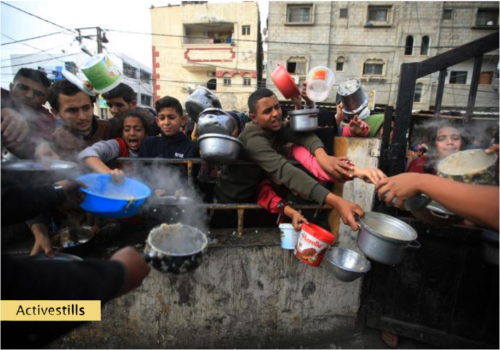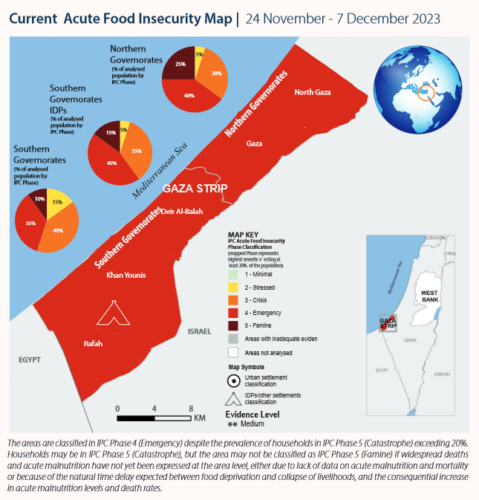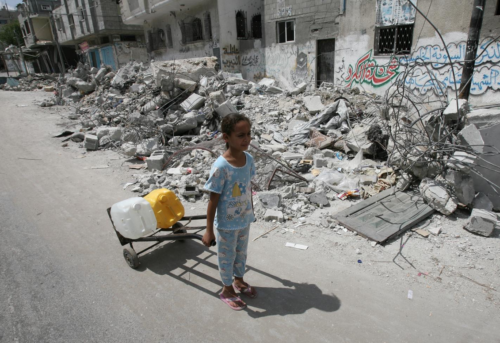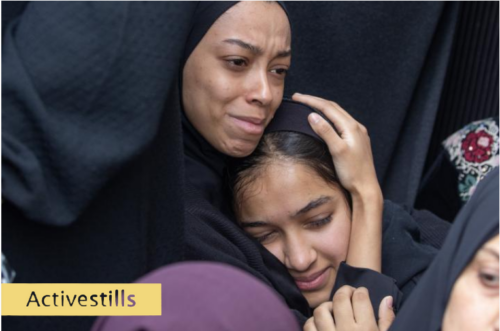Last month I joined the ‘Mourning Choir’ in my hometown of Louisville despite being a mediocre singer at best. The Choir formed after the October 7 Hamas attack, the loss of 1,139 Iraeli lives, and the continuing loss of more than 25,000 Palestinians. This crisis period has brought Jews, Muslims, Christians, and others into community to profess our shared value for the life of every single person. While anti-Muslim and antisemitism incidents have increased, the time has brought people together to sing Ceasefire Carols, and to hold vigils, rallies and interfaith events all calling for a ceasefire and an end to the bloodshed.

Clamoring for food in Rafah, Gaza (23 Dec 2023) Photo credit: Mohammed Zaanoun
Food and water are being used as weapons of war by the Israeli government, and so I desperately ask, “How might scripture help me and other Christians navigate the current catastrophe?”
In Matthew 25, when a crowd was gathered on the hill to hear Jesus preach and the crowd was hungry, the disciples wanted to send them away. Instead, Jesus instructs them in Mark’s gospel “you give them something to eat.” Then, in 1 John 3:17-18, we have these words: “How does God’s love abide in anyone who has the world’s goods and sees a sibling in need and yet refuses help? Little children, let us love, not in word or speech, but in truth and action.”
Throughout scripture, we are called by God to care for one another, to feed the hungry, to protect the vulnerable, and to meet the needs of any who are suffering. Now is the time to grasp what is happening in front of us and to act as God calls.
“As we speak, at least one million Palestinians in the Gaza Strip, half of whom are children, are starving, not because of a natural disaster or because of the lack of generous aid waiting at the border,” said Palestinian Foreign Minister Riyad al-Maliki. “No, they are starving because Israel is deliberately using starvation as a weapon of war against the people it occupies.” (GeoTV News)
The World Health Organization has stated that “an unprecedented 93% of the population in Gaza is facing crisis levels of hunger. ”A recent New Yorker article, Gaza is Starving, estimates that the 577,000 children, women, men and elders starving to death in Gaza represent four-fifths of those experiencing “catastrophic hunger” globally.
children, women, men and elders starving to death in Gaza represent four-fifths of those experiencing “catastrophic hunger” globally.
Gaza is at risk of famine in the next several months predicts a report from the United Nations World Food Program. The report said, “This is the highest share of people facing high levels of acute food insecurity” ever recorded “for any given area or country.”
The conditions are exacerbated by Israel’s continuing strikes on Gaza, including on its bakeries, water facilities, and last remaining operating mill, and the razing of agricultural lands, crops, orchards, and greenhouses. Livestock that have not been killed already are starving. For months, Israel has been stopping trucks from bringing humanitarian aid to Gaza, a clear violation of international law.
Water too is a life-threatening concern. The water crisis was decades in the making, and the Gazan water infrastructure has further deteriorated.(New Scientist) Gazans are dependent on desalinated water plants run by electricity, and since the main power plant was bombed, the plants have shut down throughout Gaza. Water mains have been damaged or destroyed by Israel’s bombardments and Israeli forces control the area around Gaza City’s only desalination plant. (NPR) United Nations Relief and Works Agency, the U.N. agency providing relief to Palestinian refugees in the Gaza Strip, says 70% of the population is drinking salty and contaminated water.
The World Food Program has reported that there are only 1.5 – 1.8 liters of water available per person per day for drinking and all uses in Gaza, far below the ‘emergency threshold’ of 15 liters per day for “war or famine-like conditions” or the “survival threshold” of 3 liters per day.

Photo credit: Palestinian Hydrology Group
With the shortages of food and water, experts are now predicting that more Palestinians in Gaza will die from starvation, thirst, and disease than from airstrikes. (NPR)
In 2022 the Presbyterian Church (U.S.A.) called on the U.S. government to “exhort the government of Israel to end the siege of Gaza that restricts its access to adequate water and electricity and the entrance of food, medicine, and fuel to Palestinians in Gaza so as to alleviate and end the humanitarian and environmental crises caused by the siege and provide the material resources necessary for economic prosperity, human health and safety, and environmental protection.” (PCUSA General Assembly Resolution)
This urgent plea was added to the 2018 call for an end to Israeli occupation of Gaza and the 2016 General Assembly Resolution, which stated:
“Appropriate agencies of the General Assembly and all Presbyterians urge the Israeli government, as a matter of policy and practice, to stop the collective punishment and isolation of broad sections of the Palestinian population—the blockade of Gaza, the demolition of Palestinian homes and the administrative detention, the torture and forced feeding of Palestinian detainees—and to restore the ID documents and citizenship status that have been stripped from Palestinians in East Jerusalem and elsewhere.”
We value the life of every person and our call is for an immediate and permanent ceasefire, along with the return of hostages, and the release of prisoners. Until this happens, the death and maiming continue unabated.
The PC(USA) stands with people of faith around the world affirming the World Council of Churches statement urging faith communities to re-engage in active and sustained support of efforts to bring just and lasting peace between Israelis and Palestinians, based upon an end to the illegal occupation and to the siege of Gaza, recognition of the equal human rights of all, and the applicable principles of international law. Without this, peace cannot be sustained, and the cycle of violence is tragically likely to continue. Likewise, we invite all people of good will, to pray for peace, and to actively support the ministries of the churches of the region and ecumenical and interfaith initiatives for justice, peace and reconciliation between Israelis and Palestinians.

Destruction follows an Israeli military raid, funeral in Nur Shams refugee camp, West Bank (17 Dec 2023) Photo credit: Wahaj Bani Moufleh
Every day, ten children in Gaza lose one or both legs. In just three months, over 10,000 children have had a limb amputated, sometimes without anesthesia. (MSN, CNN) The IDF’s ceaseless bombardment has destroyed hospitals, schools, apartment buildings, refugee camps, mosques, churches, and UN shelters. Carpet bombs flatten entire blocks, and beneath the rubble, human beings are trapped and killed. The IDF attacks have wiped entire families off the civil registry. At least 25,474 Palestinian people are dead (as of Jan. 21), and nearly 40% of them are children.
Philippe Lazzarini, the commissioner general of UNRWA, the United Nations agency in Gaza, said “An entire generation of children is traumatized and will take years to heal. Thousands have been killed, maimed, and orphaned. Hundreds of thousands are deprived of education. Their future is in jeopardy, with far-reaching and long-lasting consequences.” (NPR)
Only when a ceasefire is achieved, can the world begin mobilizing to restore humanitarian access and assistance, basic services, and ultimately an end to the occupation.
May it be so. Please join me in trying to make it be so!
Actions you can take:
- Urge a Ceasefire for Gaza now! The Biden administration and members of Congress need to hear from people of faith.
- Watch the video recording of Complicity & Its Consequences: A Conversation Examining U.S. Government Involvement in Ongoing Violence in Gaza and the West Bank – December 8, 2023.
- Join or follow the Gaza Ceasefire Pilgrimage during Lent in solidarity with the people of Gaza.
- Explore the collection of excellentPresbyterian learning and action resources on Israel-Palestine.
- Read the Statement: National Coalition Urges Congress to Confront U.S. Complicity in Civilian Harm in Gaza
- Join with others to ask your local government to pass a resolution requesting the U.S. government to push for ceasefire and call your representatives in Washington every day.
 Andrew Kang Bartlett serves as the Associate for National Hunger Concerns, Presbyterian Hunger Program, PC(USA). Andrew has degrees from Friends World College and San Francisco State University. He has worked and studied in the Dominican Republic, Cuba, Mexico, and Central America, and lived for five years in East Asia working with Koreans in Japan on their civil rights struggles, primarily at the Korean Christian Center in Osaka. This summer he’ll celebrated 35 years of marriage with his former Korean drums teacher, Haeja Kang. They have two children – Elías (29), a public defense lawyer, and Julian (26), a cook for the unhoused population in Louisville. For fun Andrew enjoys group reading of Rudolf Steiner, yoga, ecstatic dance, hiking, cycling, pickleball, and growing sweet potatoes.
Andrew Kang Bartlett serves as the Associate for National Hunger Concerns, Presbyterian Hunger Program, PC(USA). Andrew has degrees from Friends World College and San Francisco State University. He has worked and studied in the Dominican Republic, Cuba, Mexico, and Central America, and lived for five years in East Asia working with Koreans in Japan on their civil rights struggles, primarily at the Korean Christian Center in Osaka. This summer he’ll celebrated 35 years of marriage with his former Korean drums teacher, Haeja Kang. They have two children – Elías (29), a public defense lawyer, and Julian (26), a cook for the unhoused population in Louisville. For fun Andrew enjoys group reading of Rudolf Steiner, yoga, ecstatic dance, hiking, cycling, pickleball, and growing sweet potatoes.